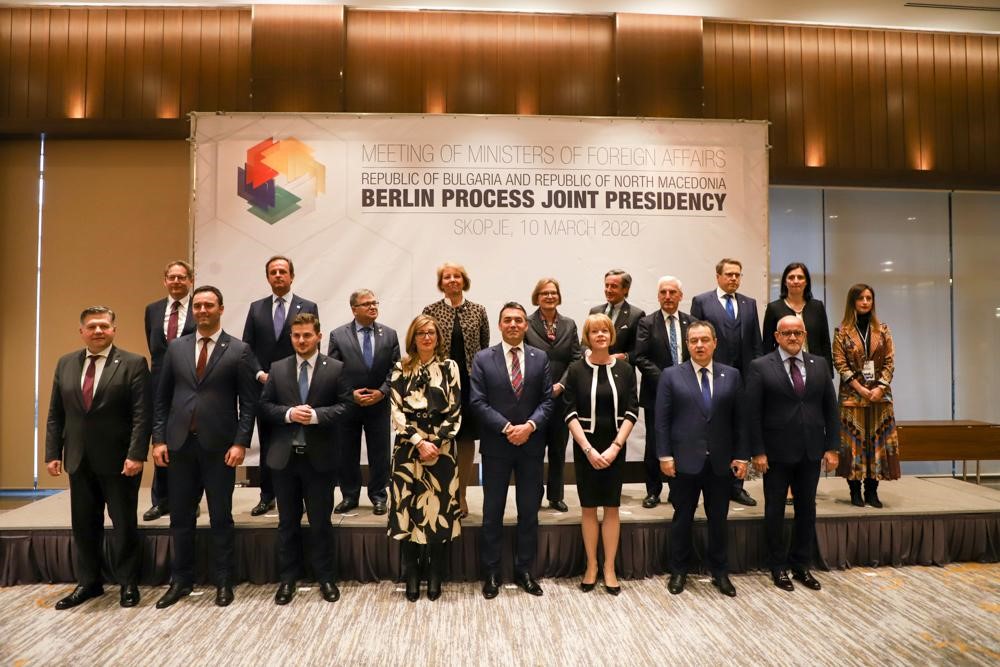Ekaterina Zaharieva, Nikola Dimitrov Host Meeting of Foreign Ministers of Berlin Process for Western Balkans
11 March 2020 News
Deputy Prime Minister and Minister of Foreign Affairs Ekaterina Zaharieva and Nikola Dimitrov, caretaker Minister of Foreign Affairs of the Republic of North Macedonia, hosted the Meeting of the Foreign Ministers of the Berlin Process for the Western Balkans in Skopje. This was the first of a series of important events within the framework of the joint presidency of the Process held by Bulgaria and the Republic of North Macedonia in 2020.
“This first joint presidency of two countries symbolizes the region’s presence in the Berlin Process. We consider it a positive sign that a Member State and a candidate country can work together in the interest of states in their region,” Ekaterina Zaharieva said at the meeting.
Nikola Dimitrov thanked Ekaterina Zaharieva for working alongside him within the framework of the joint presidency and highlighted three messages it has sent to the region and to Europe: “Our joint presidency has been a signal of greater confidence in the region. It is also has an important impact on the self-confidence of the Balkans because it demonstrates that two neighboring countries can pull this off. It is also of significance to our bilateral relations. This is an additional tool we can use to work together and tackle the outstanding historical issues between us,” Dimitrov said.
The goal of the Berlin Process, which was promoted by German Chancellor Angela Merkel in 2014, is to assist the European integration of the Western Balkan countries by placing greater emphasis on the economy and on connectivity. Ekaterina Zaharieva reiterated that Bulgaria’s support for the European integration of the Western Balkan countries remains one of the priorities of Bulgaria’s foreign policy.
“Bulgaria will continue to support the efforts of the Western Balkan countries on their journey to the EU but these, in fact, have to be a joint efforts,” the Bulgarian Foreign Minister said. She pointed out the joint presidency of the Berlin Process as an example of development and an achievement of the Balkans.
“Although the region has a long way to go as regards connectivity and media freedom, good-neighborliness and rule of law, this joint presidency has indeed been unique. The fact that both Nikola and I are here together, something that would have been unthinkable three years ago, demonstrates the transformation in the Balkans in these three years,” Ekaterina Zaharieva said. She urged her counterparts in the Western Balkans to no longer focus on the past alone but look to the future, work together on joint projects and try to develop good-neighborly relations.
The two ministers agreed that wisdom is needed when tackling problems. “To build true friendship we must lean on the truths of the past and accept reality,” Ekaterina Zaharieva said in her comments.
The joint presidency of Bulgaria and the Republic of North Macedonia focuses on the following priorities: expansion of the existing spheres of cooperation in the Western Balkans region, improvement of connectivity along all of its dimensions: transport, energy, digital connectivity; interpersonal connectivity, bringing young people closer together through education, conservation of the environment.
The six Western
Balkans countries taking part (the Republic of North Macedonia, Albania, Serbia, Kosovo, Montenegro and Bosnia and Herzegovina) adopted a joint statement at the meeting, confirming their wish to become full members of the European family and to carry out the reforms needed for this to materialize. They called for the Western Balkans’ European prospects to remain high on the EU’s agenda.
These countries welcomed the joint Presidency of the Berlin Process of Bulgaria and the Republic of North Macedonia as a model applied for the first time ever within the framework of the initiative and offering clear prospects for strengthening regional cooperation.
“We also welcome the priorities of the Joint Presidency. The efforts to promote in-depth regional cooperation, connectivity and facilitated movement of goods, services, capital and people will keep our economies alive and our industries competitive,” the joint statement of the six countries reads. They pledged support for the Joint Presidency’s plans to seek close cooperation with all partners, including the European institutions, the Regional Development Council based in Sarajevo, the participants in the Berlin Process and international financial institutions.
The Berlin Process for the Western Balkans includes the following members: Serbia, the Republic of North Macedonia, Bosnia and Herzegovina, Montenegro, Kosovo, and Albania, and the following EU Member States: Germany, France, Austria, Italy, Bulgaria, Poland, Croatia and Slovenia.



